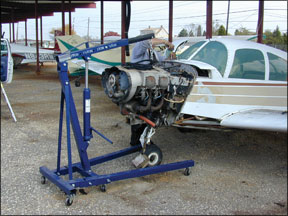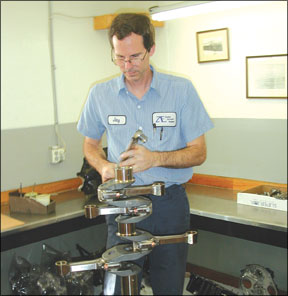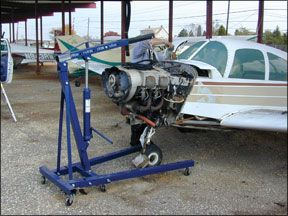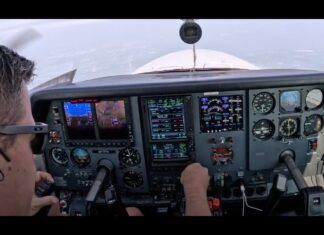If there is a truism regarding piston aircraft engines, its this: Standard warranties arent. Our research and responses to a recent survey suggest that manufacturer and shop support quality is all over the map, literally and figuratively. For example, engine manufacturers generally enforce limitations in warranty provisions, without exceptions, right? Most of the time, yes, but evidence suggests exceptions are made.
At the other end of the spectrum, stories abound of local overhaul shops going beyond their warranties, usually as a way to ensure favorable reports about them spread among area pilots. But if they go out of business, where does that leave

you?
Despite those exceptions-or perhaps because of them-survey responses indicate youre better off addressing the obvious questions of expense and downtime by sticking close to home: If one shop did all the work, you know where to go if something isn’t right. But if you bought a factory reman, for example, and your local FBO did the installation, getting the right person to pay attention to a problem can be, well, a problem.
The good news is there are plenty of choices; the bad news is horror stories are alarmingly frequent. And, as many owners know, it seems no matter whose cylinders are bolted on, there’s no guarantee there wont be an AD or factory recall adding to the frustration.
“Standard” Warranty?
Most engines probably make it to their TBO with little more than oil changes and some spark plugs, or maybe a top overhaul, But a few engines roll over long before that. The reasons for premature overhaul can range from disuse to faulty assembly and-as both TCM and Lycoming owners have learned over the last decade-bad crankshaft batches. And even reputable engine shops with years in the business fall down and build the occasional lemon.
Thats what warranties are for. Experienced operators know a shops reputation for standing behind its work matters as much, if not more, than the quality of the overhaul itself. The table at right summarizes the published warranties available from Continental and Lycoming, along with a few of the well-known rebuilders. As this summary indicates, the warranty on your factory-remanufactured or field-overhauled engine depends not only on which manufacturers engine goes in your aircraft but also from whom you purchase it.
When we last looked at this topic in 1998, the basic engine warranty ran for six months, usually with some pro-rating to TBO. Now-thanks probably to more competition instead of better engines-most basic warranties run for at least 12 months. Exceptions include Lycoming, Penn Yan, Ram Aircraft and Zephyr but, even so, finding a shop willing to pro-rate its warranty beyond initial coverage to TBO is easy.
When the warranty clock starts ticking can be an issue, though. Lycoming, for example, starts the clock when the engine is shipped. Continental starts the warranty from the engines first date of operation or 180 days after invoicing, whichever is sooner. Other shops start counting at installation, at delivery or 30 days after the engine is shipped. So, if you buy an engine today for your experimental project, but might not fly it for a couple more years, beware.
All of this tripped up one owner: “A few years ago a friend of mine purchased a rebuilt engine from Mattituck for his Piper Arrow,” wrote Ken Paskar. “Due to various circumstances…all the repairs to the aircraft were not completed until almost eight months after taking delivery of the engine from Mattituck. The engine came with a six-month warranty from the date of delivery, so once the plane was airworthy, there was no longer any warranty left on the engine.”
You should also consider the cylinders being installed, as we’ll as accessories like magnetos, vacuum pumps and alternators. Some engine builders warrant these items, but not for as long as their original manufacturer. And here lies an easy trap for some and a lesson for others. we’ll let Peter Weiskopf of Hollywood, Maryland, tell the story.
“Three years ago my partners and I bought a factory-overhauled Lycoming O-320-E2D through H&H Propeller/Triad. After the first year, but before the second year, the Kelly starter died. Both Triad and the Lycoming factory said, One year on accessories, it doesnt matter that the starter manufacturer places a two-year warranty on it. We called Kelly Aerospace; real nice people. They shipped a starter

and said to send the old one back. They were clueless why Triad and Lycoming would not help.” In our view, Weiskopfs difficulty getting the shop to deal with the problem is an anomaly. More on that later .
Have Things Changed?
When we last looked at engine warranties in 1998, we noted “favorable comments on warranty performance outweighed the negative by about three to one.” This time, favorable comments were more or less equally balanced by unfavorables. Continental took some hits back then for what we labeled an “inflexible response” to warranty issues. Not much has changed over the years: “Bought a factory reman TSIO-360-FB from Continental,” wrote James Knox in 2009. “Within 25 hours of operation it was clear there would be problems. I sent letters documenting the problems then spent two years getting promises from TCM that someone would come out and look at it. Finally, I replaced all cylinders at my own expense.”
On the other hand, Steve Zeller reports favorably on his dealings with Continental. “I fly an older model Bonanza, powered by an E-series Continental engine. I am on my third set of new Continental cylinders in under 2000 hours. The first set…lasted approximately 650 hours before the barrels were so worn they couldnt even be bored oversize. There was no longer any warranty coverage at this point. The second set…lasted another 650 hours, before I began experiencing excessive valve guide wear. When two of the six began to show visible head separation at 750 hours, Continental stepped in and offered me a new set of cylinders at no charge. I would thus have to rate Continental as having problems, but working proactively to try and solve them.”
A Lycoming tale from Vern Schulze involved his Grumman Cheetah. “In 2004, I purchased a rebuilt Lycoming O-320-E2G through Plane Power. About nine months later, I had a carburetor issue. After a short discussion with a customer support person at Lycoming, they agreed to pay for removal and reinstallation of my carburetor, shipment to a carburetor repair facility and for the parts and labor of the modification. I believe Lycoming made a good faith effort to live up to my expectations for this modification.”
Other stories like these from our survey run about 50-50 favorable/unfavorable, with fewer overall responses than in 1998. One conclusion we can draw is fewer owners are experiencing any infant-mortality problems with their factory engines: Owners rarely submit warranty claims without experiencing a problem. But we feel sticking close to home results in the best warranty service.
Think Locally
When the IO-520 in our Debonair started showing signs of fatigue in 2003, we closely evaluated the many alternatives, even considering an upgrade to the IO-550. That option would have meant a $10,000 Delta, something we werent able to justify at the time. Neither were we able to withstand the sticker shock of even a remanufactured engine, since the prop and all accessories needed to go out, plus there were still R&R costs to pay. Instead, we opted to have a local engine shop, Aero Engines of Winchester, Virginia do a field overhaul, which included a new crankshaft and new Millennium cylinders. So far, its been a decision that worked well.
For one thing, getting the airplane to the shop was painless. For another, we only had to write one check; there were no worries about paying the factory, then paying the installer, the prop shop and the accessory guys. Total downtime was four weeks, during which a one-hour drive could get us to the shop for consultation.
When we showed up to take delivery, Schweitz took time to go over all the log entries, yellow tags and installation details. A year or so later, when the overhauled starter disintegrated, he traded us two pulled starters. The one we installed is still there-we havent had to touch our spare.
The moral is that youre more likely to get good engine work done at the outset and better service after installation when you stay close to home and deal with a known shop. Smaller shops depend on word of mouth among pilots for their market and have a vested interest in keeping pilots happy. Theyll often go beyond their stated warranty when stuff happens, as Aero Engines of Winchester did for us.
When aerobatics enthusiast Farrell Woods needed an overhaul, he turned to Barrett Precision Engines. “Long story short,” wrote Woods. “Ive not had to make any claim on this engine. Ive not even had a fouled plug. My plane is in annual today but the engine has already passed muster. The folks at Barrett have always been extremely responsive to me. If I call them on the phone with a question or send an e-mail, I almost always get a response the same day. I did call them a few times with my various questions, especially with Lycomings crankshaft recall du jour, to confirm that I did not have an affected crank. I have no doubt that if I call or send e-mail to Barrett today, that Ill receive a swift answer.”
For another example, heres Joe Goedker: “My experience was with an IO-550 Rebuilt at Chuck Ney Enterprises in Tulsa. The original rebuild had a pesky crankshaft oil seal leak which would not respond to any known repair. After several new seals were installed by local mechanics, owner Chuck Ney drove in and personally reinstalled the seal. A short time later, same thing, and Chuck then sent a completely different rebuilt engine to solve the problem. The entire process was obviously much more difficult and time consuming than this. However, I am pleased to say in the end everybody was happy. Having purchased many engines from many sources I was impressed with this service.”
Conclusion
As we wrote in 1998, “there’s no doubt that price pressure brought about by the factories entry into the overhaul business has put pressure on field shops. Many cant do much to lower their prices, since they lack the factories economy of scale on parts pricing. But field shops can respond with more favorable warranties and they appear to be doing just that, both in stated warranty and in actual warranty performance.”
Were pleased to see field overhaulers and local shops are meeting or exceeding factory warranties and we stand by that 11-year-old conclusion. There are, of course, exceptions everywhere, whether youre considering a factory-new engine or a field overhaul to serviceable limits. In either instance, we strongly urge doing research on costs, schedules and customer support just as you’ll make decisions on what to do about accessories and cylinders. (For help on this, see our last engine shop survey in the April, 2005 issue, also available on the Aviation Consumer Web site at www.aviationconsumer.com.
Warranties are a part of the selection equation-maybe the most important part. We and many survey respondents find staying close to home for engine work has benefits. Whats written on a warranty is only one of them.


